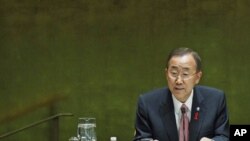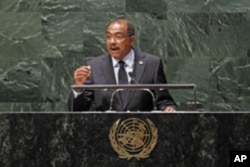At the start of a high-level U.N. conference on the global AIDS response, U.N. Secretary-General Ban Ki-moon said the international community had gathered not to fight the disease, but to end it. Citing progress over the last 30 years since HIV and AIDS were first discovered, Ban said the goal now is to end the disease within the next 10 years.
It is an ambitious goal: zero new infections, zero discrimination and zero AIDS-related deaths. The U.N. chief said it is possible, but would require bold action.
“Today’s historic meeting is a call to action," said Ban. "First, we need partners to come together in the global solidarity as never before. That is the only way to truly provide universal access to HIV prevention, treatment and care by 2015. Second, we have to lower costs and deliver better programs. Third, we must commit to accountability. Fourth, we must ensure that our HIV responses promote health, human rights, security and dignity of women and girls. Fifth, we must trigger a prevention revolution, harnessing the power of youth and new communications technology to reach the entire world.”
Ban said if the international community takes these five steps, AIDS can be stopped.
“We can end the fear," he said. "We can stop the suffering and death it brings. We can get to an AIDS-free world.”
The executive director of UNAIDS, Michel Sidibé, noted how far the world has come in its understanding about HIV - the virus that causes AIDS - and the illness itself. He said 30 years ago this mystery disease was seen as a gay plague and there was great fear surrounding those who were infected. He said this image is part of the history of the AIDS movement, which, he said is the story of people breaking the conspiracy of silence, demanding equality and dignity, and of confronting society’s wrongs.
“It is the story of people’s outrage and a passionate call for social justice," said Sidibé. "Over the past 30 years, AIDS has forged a social new compact between the global north and the south. And we mobilized unprecedented resources with your leadership and we managed to produce live-saving results for people.”
Sidibé said this has led to great achievements in the fight against AIDS. New infections are down worldwide by nearly 25 percent in the last 10 years. In Africa, where the majority of the 34 million people living with AIDS live, more people are receiving antiretroviral treatment early, when it can have the greatest live-saving impact.
Overall, Sidibé said, there are 56 countries - 36 of which are in Africa - that have stabilized the epidemic and reduced the number of new infections significantly. He pointed to great strides in South Africa, India and China.
But even as developing countries have made progress, he warned that the value of life is not the same across the world. Sidibé noted that 1.8 million people die of AIDS every year in developing countries, while in developed nations, AIDS has become a treatable, chronic disease.
He said that while there are 6.6 million people receiving treatment in low- and middle-income countries, another 9 million are still waiting for treatment. In the global north, a new generation is being born HIV-free, while each year 360,000 babies are born with HIV in the south.
Sidibé told the 30 heads of state and government and other leaders gathered at the three-day conference that this is a defining moment. He said it is time to agree on a transformational agenda to end this epidemic.











